Dear friends,
Spiritual teacher Eckhardt Tolle said in a recent interview, “Civilization doesn’t always move in a straight line toward enlightenment.”
Back in April, if someone had told you that this summer would be the time when Americans would finally get serious about taking on the old, old problem of racism, would you have been surprised?
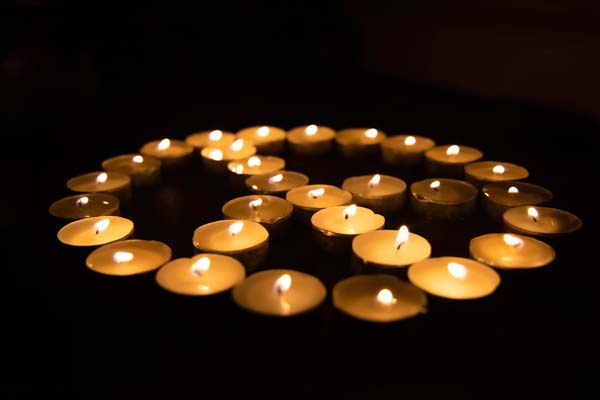
Protests during a pandemic?
2020 is shaping up to be a truly historic year, and we have an unprecedented opportunity to mobilize, take action, and demand change around the issues of racial justice and equality.
Since viewing the video of the tragic death of George Floyd, I confess that I’ve given this issue more of my attention than ever before in my life. I’ve finally committed significant time to reading, listening, absorbing, educating myself, and praying about racism.
I need to apologize for being late, and humbly acknowledge that I could have been doing so much more.
I wish it hadn’t taken this unimaginable tragedy to help me realize how naive I’ve been. I vow to take permanent, ongoing action—not just in 2020, but always.
In addition to listening and learning, part of my journey includes honestly facing my own biases and background with racism.
Getting it All on Paper
Because I process things by writing, I’ve been reflecting and writing in my notebook about my history with issues of race.
I have written pages and pages of stories, memories, regrets, discoveries, admissions, prayers, and resolutions. The recollections in my notebook are a swirl of negative and positive moments, but I know I need to dredge everything up and deal with it to let in the light.
I started by looking at my family tree.
On our mom’s side, I was interested to read that our ancestor Rufus King (1755-1827) an original signer of the Constitution, was an outspoken anti-slavery activist who introduced many bills in the Senate to abolish slavery.
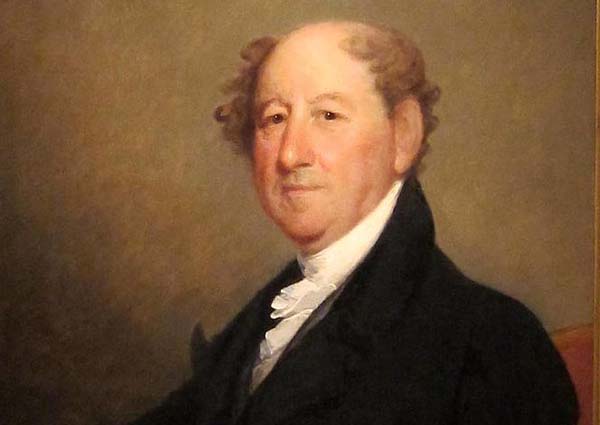
Our late dad’s family was from Tulsa, Oklahoma. The elders are long gone, so I am left to wonder about the family’s response to the sickening violence of the Tulsa race massacre of 1921 when 35 city blocks were burned to the ground and 300 African American citizens were killed.
My grandpa would have been 21 or 22. Where was he on the night of May 31, 1921?
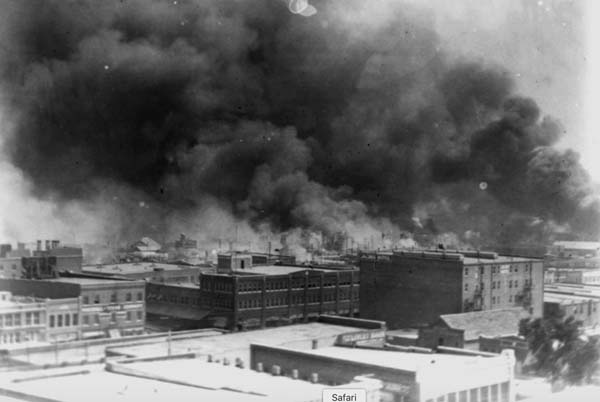
I’ve also realized that throughout my K-12 education, we were never taught about Juneteenth or Black Wall Street. Were these events part of your American History curriculum? I have so much reading to do.
I suspect much of the history I learned was whitewashed. For instance, I grew up learning that “in 1492 Christopher Columbus sailed the ocean blue.” The accounts that I read about Columbus this week, however, scorched my eyeballs.
These revelations led me to make a change in my office, where I had a print of the 1927 painting by N.C. Wyeth, “The Discoverer,” depicting early explorers. I got rid of it this week, because the image no longer sparks joy as I consider the atrocities committed against native people by some early settlers like Columbus.
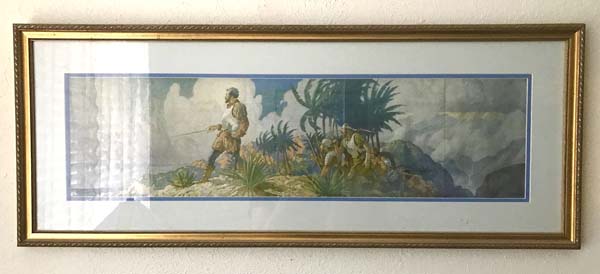
Facing My Good, Bad and Ugly Truths
I was five years old when I heard an ugly racial slur for the first time. I felt confused, and an adult in the room told me to forget what I’d just heard.
In elementary school I enjoyed playing with my Black friend down the street in Boulder, just having innocent fun. Part of the excitement was that no parents were at their home keeping an eye on us or her little brothers. Things ended badly after I told my mom and dad, and the playdates ended. My friend kept asking me to come over, and I felt ashamed each time I said, “I just can’t.”
A boy in fifth grade told awful jokes, and I remember asking, “What’s a Polack?” I feel terrible about the stupid racist jokes I heard and repeated when I was younger.
I remember my fine, talented band teacher John A. Whitehurst, the only African American faculty member at Centennial Junior High School. Mr. Whitehurst was an extremely talented musician and teacher who got so excited when we played well, but he had a sharp side that came out when we messed up.
Mr. Whitehurst is gone now, but if I could go back in time I’d practice my clarinet harder for him because he was always pushing us to be excellent.
Here’s a picture from my 9th grade yearbook of Mr. Whitehurst with our all-white band class. Check out the cringe-worthy photo caption:
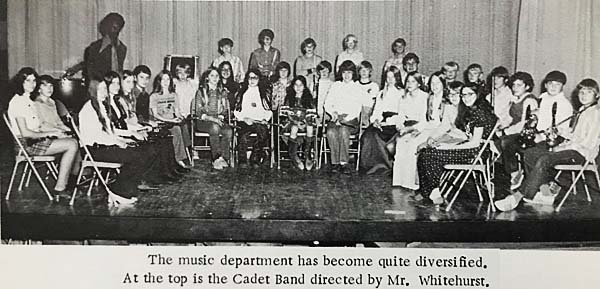
I’ve been reminiscing about my Black friends in my mostly-white high school and college, and my utter cluelessness about their challenges. Some years ago I reflected on their experiences through new eyes when I read Patricia Raybon‘s book about racial healing, “My First White Friend.” Indeed, discovering Patricia’s books and essays opened my eyes in many ways, and we became friends ten years ago. She writes extensively about faith, family, race, and moving mountains, and her friendship is a bright spot on the list in my notebook.
During a conference in Philadelphia, I had the surprise honor of meeting the great Muhammed Ali and his wife Lonnie in an elevator. Mr. Ali showed early signs of Parkinson’s disease and was a little shaky, but I’ll never forget his charisma that was so electric even during a short elevator ride.
An incident I often cite during “Two Truths and a Lie” icebreakers is the time I met O.J. Simpson at a steakhouse in Chicago and he asked me to meet him for a drink. No lie! He was handsome, confident, and very insistent, which was both flattering and frightening. I was with business colleagues so I declined, but I’ve often wondered what would have happened if I’d gone.
I’ll never forget my shock and anger when a fast-talking man suddenly grabbed my cash cab fare outside Grand Central Station and ran away. Being completely transparent I need to say that for years after that incident I held my purse a little closer around Black men, and I’m so very sorry.
I remember how unjust it felt when my Cuban-American former husband was always chosen for extra security screening at the airport, while I was allowed to go right through the line.
We adopted our son from Guatemala, and a personal incident that happened three years ago is also on my list.
Advocating for Two

One day after school, my son and his buddy—both boys with handsome brown skin—went to Best Buy. My son had $60 of pet sitting money in his pocket to buy a new video game. The boys were looking at the games when an employee suddenly came over and told them to leave the store. When they asked why, he replied, “I said you need to leave! Just get out!”
The boys were humiliated and upset, and when I heard about it this Mama Bear was HOT.
The manager was gone that day, so I poured my heart and fury into an email demanding an apology and a prompt resolution. He called me the next morning, very contrite, and explained that the employee thought the boys “looked suspicious.”
The manager had taken the time to watch the security tape and see that the boys weren’t doing anything but looking intently at the games. We had a civil, productive conversation, and he invited me to bring my son and his friend back to the store that afternoon for a talk.
In his office, the manager spoke to the boys respectfully and apologized profusely for the incident. He told them that as a result of our complaint, Best Buy had changed its policy, put the offending employee on probation, and held a staff meeting to denounce racial profiling and explain new procedures. Then he took the boys out on the floor so they could each pick out any video game they wanted as a complimentary gift.
It was a positive outcome, but this incident also illustrates a crucial point for me to remember.
The Hard Question Only I Can Answer

Using my Best Buy story above as an example, what would have happened if I hadn’t spoken up and advocated for justice?
It would be like telling my son and his friend, “I love people of all skin colors. I myself am not a racist, and I’m sorry that happened to you. It’s just not right!”
Those well-intentioned words are nice, but without taking action would anything change?
Probably not, right?
So the question I now face is: What meaningful action can I take toward ending racism? The #BlackoutTuesday box I posted on Instagram isn’t going to cut it.
Seared in my memory and on my heart are the precious names, faces, families, stories, and violent deaths of George Floyd, Breonna Taylor, Ahmaud Arbery, Elijah McClain, and so many other black lives taken.
Where might I best focus time, energy and money to make a real difference?
Moving Mountains

Leaders and politicians have failed to unite us, but here we are nonetheless standing together during this historic summer of 2020. It’s true that we haven’t moved in a straight line toward enlightenment, but many of us are determined to make a difference, pandemic or not.
Our efforts may be late and imperfect, but it’s not too late to tear down the age-old problem of racism and create a new future where people of all races and cultures are respected, treated equally, and celebrated.
Where do we begin?
NPR created an extensive resource list with books, films and podcasts to learn more about racism.
Here’s a collection of TED talks to understand racism in America and 10 movies and television shows to learn about systemic racism.
Black Enterprise compiled “The 18 Best Black Books of All Time for Black History Month,” if you’re catching up on American history like I am.
Finally, here’s a roundup of “100 Ways You Can Take Action Against Racism Right Now,” from donating money to meaningful protest actions and black businesses to support.
I’ve taken some actions that feel right for me, and I’ll keep looking for ways to help.
How About You?
Are there race-related memories and stories in your background that you’ve been thinking about this summer?
Do you feel like you received a well-balanced education in American history?
Would it help you to write about your history with racism?
I would love to hear your thoughts, perspectives, and experiences in the Comments section of this post.
This is part of my background that I will continue to reckon for the rest of my life. I’ll always feel sorry for the times I stayed silent, and I’ll always regret not advocating more, louder, and sooner.
But with reflection, God’s grace, and thoughtful action, maybe we’ll all look back on 2020 as the year we finally helped move a mountain.
Best always,





Wonderful Eliza — Your words are brave, honest and urgent. Thank you so much for showing how to write about race with truth and grace. May your essay move mountains and hearts. I’m so grateful we’re friends! With much love, Patricia
Oh my friend, your comment brought tears to my eyes. Thank you for your grace, wisdom, open heart, generosity and most of all, PATIENCE. You have taught me so much, and I am grateful beyond words for our friendship.
I’m looking forward to attending the timely, much-needed class you’re teaching on 6/18/20 for the Evangelical Press Association on writing about racism.
Writers, here’s the link to the free webinar in case you’re interested in signing up.
Love and blessings to you, Patricia!
Eliza, my dear friend.
What a beautifully written piece (as always) brings so many of my own memories to the forefront of my own childhood.
Growing up in a small town, south of Chicago, with much division on which side of town one lived on.
I however, didn’t believe I was racist either. I still don’t (!) but your words make me wonder now.
My dad was a high school basketball coach for my whole life, and sometimes not always in the “best towns” Hhmm perhaps i was racists(?)
I had many black friends as I had grown up with them from K-10, who would warn me to “not go into the bathroom” when riots would breakout in Chicago and would then filter down into the town I lived in. Our classrooms would get “locked down” just in case to keep the kids out of harms way.
I still didn’t believe I was racist. Hhmm
Having moved to Boulder for 11-12 grades I was so surprised when football and basketball games didn’t have policemen standing at the ends of the bleachers. Why? I had grown up knowing you just didn’t run under the bleachers, Period. when your coat happened to fall through. There was a reason for this in the small town I grew up in. Yes, I did see and witness many horrible things.
I did know the the stories of Christopher Columbus, and can still here the “sing song” way of touting his accomplishments.
I have had many, many experiences as a woman business owner (25 yrs) and industry professional (35 yrs inclusive) and had the opportunity to meet so many different ethnic professionals. Again, still believing no one feeling less of each other. I truly believe we all felt equal.
Was this a true feeling? “Did” all of us walk into those business conferences feeling any animosity toward each other? I truly believe not.
Your words of wisdom always touch me.
This was a very well written, heartfelt piece. Thank you for putting this “on paper”!
Pam
Dear Pam,
I love what you wrote about your background, and I learned so many new things about you. I’m deeply moved by your words and memories about growing up and going to school in racially charged environments, and how those experiences shaped you later when you went on to run a highly successful business. Thank you for being so introspective and transparent, and sharing your observations. I love you more than ever!
xxoo,
Eliza
Eliza, thank you so much for your vulnerability as you reflect honestly, for the links to resources, and for the juicy tid-bit :-) I was especially touched and inspired by your words about the Best Buy Incident. I suspect that learning to act against racism is like building a muscle; the more we summon the Momma Bear response, the easier it is to find that loving energy again when we need it. I will carry your story with me to use when I need an extra boost of that fierce love.
Amy
Thank you, dear Amy. I am grateful for our long friendship and the many deep conversations and life experiences we’ve shared over all these years. I hope you don’t mind if I share what you wrote this week as you engaged in a dialogue about racism, because I admire your willingness to be real:
“It is a little scary stepping out and sharing our thoughts right now, isn’t it? We wonder: Will we say something wrong, reveal our ignorance, leave something out, offend someone, or make things worse? We are all stumbling around, trying to do a lot of listening but knowing that at some point we will need to wade into the conversation. This is how we learn— and I, for one, have plenty to learn.”
Thank you for your courage, my friend. Love you always.
That article was not thrown together in an hour, per YOLO deadline. Or even in an afternoon. Maybe you have been working on this piece, what… many decades now? Thank you.
Thank you Jerry, my thoughtful and deep-thinking friend. You have a special gift for drawing out and sharing people’s stories, and one of the things I’ve been struck by in recent weeks is the outpouring of stories. A vastly complex word like “racism” becomes utterly tangible when we hear and absorb the collective experiences of our brothers and sisters. Thanks for your comments, and I look forward to hearing more of your stories and podcasts. xo
Eliza: What a brave and awesome share. You and hopefully readers who share with you are certainly on your way to making a better country; we have to start here. It’s absolutely right that you take actions, not just words. Just words, is how we arrived ‘here’ yet again, in our lifetimes. Here I dare say, you choose to do the hard, painful work. At this time, I can only offer what I experienced; that pain will come out, difficult to confront myths believed, etc. A thing I learned long ago is to ‘feel’ the pains, don’t become them. Feel the hurts, but don’t become them. I look forward to sharing and growing.
Dave
Dave, thank you for your very thoughtful insights. I appreciate your wisdom about finding a way to experience the pain without becoming the pain. I am trying to lean into this challenge and make a difference however I can, with hope that better days of mutual understanding, opportunities, appreciation and respect are ahead. Very grateful for your comments! ~Eliza